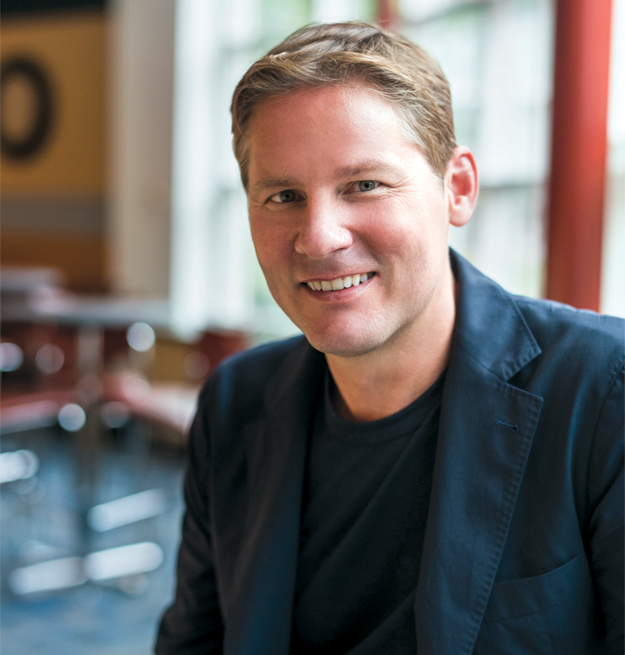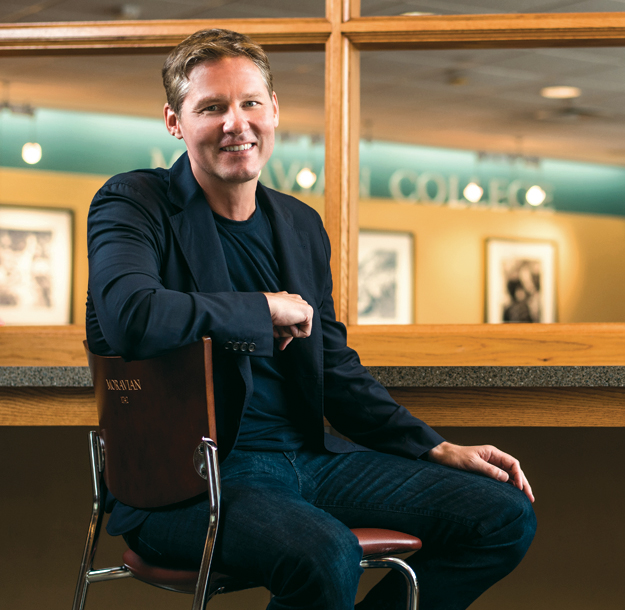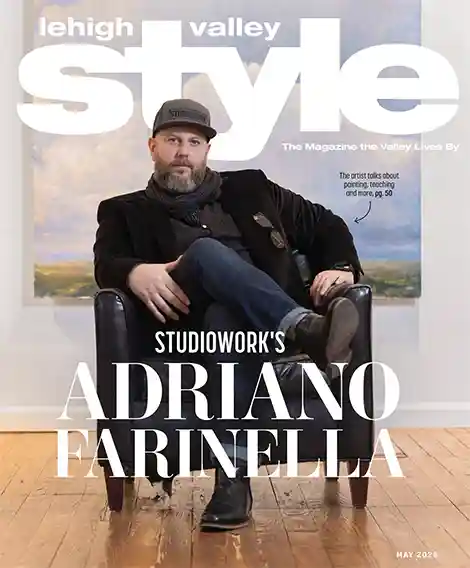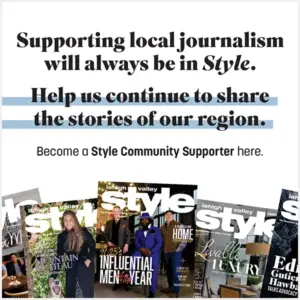
Bethlehem native David Zinczenko has earned a reputation as one of the country's leading experts in health, fitness and weight loss. The #1 New York Times best-selling author has penned 25 books, including the blockbuster Eat This, Not That series.
He spent much of his career at the Emmaus-based Rodale as the editorial director of Men's Health, Women's Health and Prevention. After leaving Rodale, he helped to redesign several major health magazines, and later founded Galvanized Media, a new media company seeking to define what healthy living means to Americans today.
But while each of Zinczenko's books and achievements is notable in its own right, it is perhaps the impact that his work has on today's culture that deserves the most recognition. The work that Zinczenko and his Galvanized partners are doing is shaping our understanding of wellness, giving countless Americans the tools and knowledge they need to build their healthiest life.
‘Eat This, Not That'
Eat This, Not That has remained one of Zinczenko's most well-known book series. First published in 2007, it's taught a generation that small, simple changes can have a big impact—and led to nationwide changes in how food manufacturers supply calorie and nutritional information.
“The whole idea of the book was to say to people, ‘This is the “no diet” weight loss solution. You're not going to give up your favorite foods, your pizza and burgers and ice cream and fries. But what I'm going to do is show you how to have the better version of all of your favorite foods. In choosing that better version, you're going to lose weight naturally,'” says Zinczenko.
His team profiled thousands of food items, contacting manufacturers and restaurants and ultimately sending many meals to food laboratories for independent analysis when companies refused to provide their nutritional information. The book highlights some of the best (and worst) meals, restaurants and grocery-store finds—suggesting simple swaps that can save hundreds or even thousands of calories. The concept was nearly cut by the publisher, who was hesitant to call out so many major food brands.
“They said ‘Wait a minute, you're going to put a Big Mac and a Whopper on the cover, and say that you should choose McDonald's over Burger King? Do you know how many letters we're going to get?' It went through an extensive review,” he says. “This was so revolutionary at the time, that you're going to call out brands at every major restaurant, every supermarket aisle, and go up against some of these huge companies. But I soldiered on, because I knew what an impact it would have on the American diet.”
Today, we take for granted that you can find the nutritional information of nearly any food or restaurant item. Many credit Zinczenko's efforts with encouraging companies to be more forthcoming with this information.
“Nine years later, you can get nutritional information any time you want it,” he says. “Manufacturers weren't going to get to this point on their own. They weren't going to just decide that this is what people want.”
Studies estimate that adults can misjudge the calorie count in a given food by up to 90 percent, he adds.
“In order to make an informed decision, we need accurate information from food manufacturers,” says Zinczenko. “Many of us get duped by a food's health halo. A banana nut muffin sounds healthy, but it's really just cake. Not only does it probably pack 500 calories, but it may have more sugar than four glazed donuts.”
While Zinczenko has authored dozens of books and countless editorial pieces, Eat This, Not That continues to define his career.
“When you produce 17 books and do so much national TV around it, that's what people are going to remember more than transforming Men's Health or creating Women's Health, turning Shape into an active lifestyle magazine. I think and I hope it's because it's had such a tremendous impact on America's food culture. The moves that so many food companies have made were sparked when we began contacting them a decade ago.”
Inspiration for Healthy Living
Zinczenko's own journey towards a healthy lifestyle began at a young age. He was overweight as a child, but vowed to lose weight and become healthy by making smarter food and exercise choices.
He joined the wresting team at Liberty High School, which led to him becoming more active and making better food choices to become more competitive. He joined the Navy Reserve after high school, which taught him even more about fitness.
He also had a powerful reminder at home of what can happen if you ignore your health. His father was morbidly obese for most of Zinczenko's life, and died at the age of 52 from a stroke.
“I swore that I'd try never to let it happen to me, because you could see the toll it took. Getting winded just walking up the stairs. That was a motivating factor, learning by negative example,” he says. The way that his father carried his weight, mostly in his belly, was also the unhealthiest form of overweight. “That sets you up for high blood pressure, high cholesterol, diabetes, all of the things he had. I certainly enjoy every kind of food imaginable, but I am very conscious of heading in that direction.”
Zinczenko would revisit the perils of belly fat when he launched the Zero Belly Diet book and brand in 2014. The “Zero Belly” diet focuses on healthy whole foods with an emphasis on plant-based foods, and reducing dairy and gluten. The concept began with a test panel of hundreds of participants.
“The results surprised even me. People were losing weight, but the stunning result was that they were losing inches on their waistline,” he says. “The best thing anyone can do for their own health is to rid themselves of belly fat.”
Zero Belly Diet became a bestseller, and was soon followed by Zero Belly Cookbook and Zero Belly Smoothies.
“People are concerned about their bellies and for the right reasons,” says Zinczenko. “A lot of people say that concentrating on that stuff is vain, but I don't see it that way. I see numerous ways that your life will improve. You'll live longer, you'll help prevent illness, you'll probably stay more free of aches and injuries. Your sex life will improve. You'll look better. You'll have more energy. There are numerous reasons why it's not about vanity, and they're all good ones.”

Galvanized
After leaving Rodale in 2012, Zinczenko was driven to continue sharing his passion for health and fitness. He joined ABC News as a nutritional consultant and helped to relaunch several fitness magazines, including Men's Fitness and Shape. In 2013, he launched his own media company, Galvanized Media, which builds and launches projects with the country's top media outlets, including ABC News, Random House and Meredith Corp. Galvanized has since grown to nearly 20 employees.
“When I started Galvanized, I had a lot of experience in books and magazines and apps and websites. I had experience going on TV, and I like doing all of those things and spreading this message of healthy living,” he says. “It was a great time to form the company and I had all of these great relationships.”
Zinczenko set out to build a group of experts who have shaped health and fitness's biggest brands. His team has roughly 200 years of combined experience, including his own 25 years in the industry.
“No one can deliver the kind of content we deliver for readers and partners because of that experience,” he says. “I'm most impressed by the passion of this team. Each and every member is motivated to create content that has an extraordinary impact on people's lives, and can help make Americans happier and healthier.”
Giving Back to the Lehigh Valley
After attending Moravian College and then spending decades at Rodale, Zinczenko has maintained strong roots in the Lehigh Valley.
“We have this saying at Galvanized: No one builds a house alone, and no one builds from the roof down,” he says. “You start from a foundation, and that foundation has to be solid enough to withstand anything that you place on top of it. My foundation is Bethlehem, and the Lehigh Valley.”
Zinczenko expressed his gratitude for everyone who has supported him throughout his journey, from his high school wrestling coaches to his family, friends and Moravian professors.
“They are my foundation and they're representatives of what makes Bethlehem so special, and special to me.”
Moravian College recently began work on the Zinczenko New Media Center, which will allow students to work on real-life media projects before graduating college.
“Of all the things that have my name on them, I might be most proud of this one,” he says. “The idea is to publish students while they're in college so that they have an edge when they graduate. They will have their websites, their blogs, their published pieces.”
Zinczenko became involved after speaking with current Moravian president Bryon Grigsby, who was a student at Moravian with Zinczenko. Zinczenko also ran the Moravian college newspaper as a student.
“I wanted to give back to the Lehigh Valley, to Bethlehem and to Moravian,” he says. “A new media center seemed like the perfect way to provide a home for future leaders in the new media space.
“It comes full circle in the coolest way. I couldn't be happier.”
















